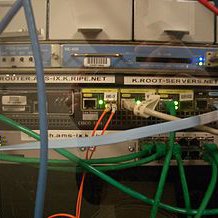Following my research on DNS reachability and performance, I found interesting results for specific domain names.
Curious case of corrupted MX response
Following my research on DNS reachability and performance (please see part 1 and part 2 of this story), I came across an interesting result with specific domain names. While looking up almost every DNS request from Google Public DNS took about 100 milliseconds, specific queries from the same DNS servers were being resolved in under 10 milliseconds. In some cases the reply was not authentic or even corrupted altogether 1 .
Here is an example of a normal DNS query being sent to Google Public DNS (using dnsping ):
./dnsping.py -c 3 -s 8.8.8.8 -t A apple.com DNSPING 8.8.8.8: hostname=apple.com rdatatype=A 100 bytes from 8.8.8.8: seq=0 time=97.000 ms 100 bytes from 8.8.8.8: seq=1 time=97.803 ms 100 bytes from 8.8.8.8: seq=2 time=90.176 ms --- 8.8.8.8 dnsping statistics --- 3 requests transmitted, 3 responses received, 0% lost min=90.176 ms, avg=94.993 ms, max=97.803 ms, stddev=4.191 ms
The same query for domain twitter.com takes much less time:
% ./dnsping.py -c 3 -s 8.8.8.8 -t A twitter.com DNSPING 8.8.8.8: hostname=twitter.com rdatatype=A 33 bytes from 8.8.8.8: seq=0 time=8.390 ms 33 bytes from 8.8.8.8: seq=1 time=12.722 ms 33 bytes from 8.8.8.8: seq=2 time=17.546 ms --- 8.8.8.8 dnsping statistics --- 3 requests transmitted, 3 responses received, 0% lost min=8.390 ms, avg=12.886 ms, max=17.546 ms, stddev=4.580 ms
Resolving the SOA record for the same domain yields normal results (note the ~100ms response time):
% ./dnsping.py -c 3 -s 8.8.8.8 -t SOA twitter.com DNSPING 8.8.8.8: hostname=twitter.com rdatatype=SOA 95 bytes from 8.8.8.8: seq=0 time=133.951 ms 95 bytes from 8.8.8.8: seq=1 time=98.027 ms 95 bytes from 8.8.8.8: seq=2 time=93.309 ms --- 8.8.8.8 dnsping statistics --- 3 requests transmitted, 3 responses received, 0% lost min=93.309 ms, avg=108.429 ms, max=133.951 ms, stddev=22.228 ms
Looking at the results above, a network expert would conclude that some specific queries are being handled locally.
I observed another anomaly when I tried to look up the MX record locally and noticed MX records for these domains are not resolved correctly:
% dig -t MX twitter.com @8.8.8.8 ;; Got bad packet: bad label type 45 bytes 40 10 81 80 00 01 00 01 00 00 00 00 07 74 77 69 @............twi 74 74 65 72 03 63 6f 6d 00 00 0c 00 01 c0 0c 00 tter.com........ 0c 00 01 00 00 03 79 00 03 41 41 41 00 ......y..AAA.
Repeating the same experiment using RIPE Atlas , confirmed my initial analysis and I found out most of the probes in Iran cannot resolve the MX record for the domain twitter.com and they receive a bad reply in less than 100ms.
Taking a closer look at the DNS request and response using tshark, it seems that in the answer to my MX query, I received a PTR answer with corrupted RDLENGTH and RDATA fields.
Here is the query :
% tshark -O dns -2xnVr bad-mx-reply.pcap -R "frame.number eq 1"
Frame 1: 71 bytes on wire (568 bits), 71 bytes captured (568 bits) on interface 0 (outbound)
Ethernet II, Src: xx:xx:xx:xx:xx:xx, Dst: xx:xx:xx:xx:xx:xx
Internet Protocol Version 4, Src: 192.168.0.106, Dst: 8.8.8.8
User Datagram Protocol, Src Port: 53046 (53046), Dst Port: 53 (53)
Domain Name System (query)
[Response In: 2]
Transaction ID: 0x31d2
Flags: 0x0100 Standard query
0... .... .... .... = Response: Message is a query
.000 0... .... .... = Opcode: Standard query (0)
.... ..0. .... .... = Truncated: Message is not truncated
.... ...1 .... .... = Recursion desired: Do query recursively
.... .... .0.. .... = Z: reserved (0)
.... .... ...0 .... = Non-authenticated data: Unacceptable
Questions: 1
Answer RRs: 0
Authority RRs: 0
Additional RRs: 0
Queries
twitter.com: type MX, class IN
Name: twitter.com
[Name Length: 11]
[Label Count: 2]
Type: MX (Mail eXchange) (15)
Class: IN (0x0001)
0000 64 66 b3 87 4a e0 88 63 df 8c a7 83 08 00 45 00 df..J..c......E.
0010 00 39 bd 61 00 00 40 11 ec 30 c0 a8 00 6a 08 08 .9.a..@..0...j..
0020 08 08 cf 36 00 35 00 25 50 ae 31 d2 01 00 00 01 ...6.5.%P.1.....
0030 00 00 00 00 00 00 07 74 77 69 74 74 65 72 03 63 .......twitter.c
0040 6f 6d 00 00 0f 00 01 om.....
And the answer:
% tshark -O dns -2xnVr bad-mx-reply.pcap -R "frame.number eq 2"
Frame 2: 87 bytes on wire (696 bits), 87 bytes captured (696 bits) on interface 0 (inbound)
Ethernet II, Src: xx:xx:xx:xx:xx:xx, Dst: xx:xx:xx:xx:xx:xx
Internet Protocol Version 4, Src: 8.8.8.8, Dst: 192.168.0.106
User Datagram Protocol, Src Port: 53 (53), Dst Port: 53046 (53046)
Domain Name System (response)
[Request In: 1]
[Time: 0.007404000 seconds]
Transaction ID: 0x31d2
Flags: 0x8180 Standard query response, No error
1... .... .... .... = Response: Message is a response
.000 0... .... .... = Opcode: Standard query (0)
.... .0.. .... .... = Authoritative: Server is not an authority for domain
.... ..0. .... .... = Truncated: Message is not truncated
.... ...1 .... .... = Recursion desired: Do query recursively
.... .... 1... .... = Recursion available: Server can do recursive queries
.... .... .0.. .... = Z: reserved (0)
.... .... ..0. .... = Answer authenticated: Answer/authority portion was not authenticated by the server
.... .... ...0 .... = Non-authenticated data: Unacceptable
.... .... .... 0000 = Reply code: No error (0)
Questions: 1
Answer RRs: 1
Authority RRs: 0
Additional RRs: 0
Queries
twitter.com: type PTR, class IN
Name: twitter.com
[Name Length: 11]
[Label Count: 2]
Type: PTR (domain name PoinTeR) (12)
Class: IN (0x0001)
Answers
twitter.com: type PTR, class IN
Name: twitter.com
Type: PTR (domain name PoinTeR) (12)
Class: IN (0x0001)
Time to live: 889
Data length: 3
[Malformed Packet: DNS]
0000 88 63 df 8c a7 83 64 66 b3 87 4a e0 08 00 45 00 .c....df..J...E.
0010 00 49 00 00 00 00 3b 11 ae 82 08 08 08 08 c0 a8 .I....;.........
0020 00 6a 00 35 cf 36 00 35 fb c6 31 d2 81 80 00 01 .j.5.6.5..1.....
0030 00 01 00 00 00 00 07 74 77 69 74 74 65 72 03 63 .......twitter.c
0040 6f 6d 00 00 0c 00 01 c0 0c 00 0c 00 01 00 00 03 om..............
0050 79 00 03 41 41 41 00 y..AAA.
You will notice the anomaly in the reply shown above. While the query was made clearly for an MX (Type 15) record, the replied packet contains an answer for PTR (Type 12) record. Also the “Data length” field is 3, while the payload contains 4 bytes (in the last line in the packet dump you can see “03” followed by “41 41 41 00”).
Trying the same query from any other host around the world, I could not reproduce the same result. Therefore I assume this is only happening inside Iran.
Later I used the list of top 10,000 domains (according to OpenDNS) to figure out if this anomaly is happening for any other major domain. So I wrote a quick script to look up MX records for all the domains and foundnd corrupted results.
The tests confirmed that the same anomaly was seen on 139 out of 10,000 major domains 2 .
Conclusion
It would be a good idea to have local instances of major DNS resolvers to improve user experience. However, a misconfigured DNS server or any network device may have huge impacts on end user experience.
The anomaly we discussed in this report could have enormous negative impact on email traffic and may avoid delivering emails to certain domains.





Comments 1
The comments section is closed for articles published more than a year ago. If you'd like to inform us of any issues, please contact us.
Afshin Paydar •
It's seems DNS traffic (UDP/53) for public DNS Servers in Iran ,route to somewhere else : From IRAN # traceroute -n -p53 8.8.8.8 traceroute to 8.8.8.8 (8.8.8.8), 30 hops max, 60 byte packets 1 172.16.1.1 79.388 ms 79.650 ms 79.662 ms 2 10.201.145.8 98.153 ms 98.178 ms 98.167 ms 3 10.201.145.1 98.332 ms 119.185 ms 119.201 ms 4 10.10.53.77 119.548 ms 119.532 ms 119.514 ms 5 10.10.53.142 119.484 ms 10.10.53.134 119.790 ms 10.10.53.130 119.777 ms 6 * * * 7 134.0.217.121 261.541 ms 242.936 ms 242.872 ms 8 * * * 9 * * * 10 * * * 11 * * * 12 * * * 13 * * * 14 * * * 15 * * * 16 * * * 17 * * * 18 * * * 19 * * * 20 * * * 21 * * * 22 * * * 23 * * * 24 * * * 25 * * * 26 * * * 27 * * * 28 * 10.201.145.8 59.400 ms !X * ................................. From IRAN : # traceroute -n 8.8.8.8 traceroute to 8.8.8.8 (8.8.8.8), 30 hops max, 60 byte packets 1 172.16.1.1 75.141 ms 75.462 ms 75.466 ms 2 10.201.145.8 92.356 ms 97.859 ms 98.188 ms 3 10.201.145.1 98.397 ms 113.424 ms 113.531 ms 4 10.10.53.77 114.207 ms 114.210 ms 114.206 ms 5 10.10.53.134 114.202 ms 114.197 ms 10.10.53.130 114.193 ms 6 10.10.53.162 148.063 ms 72.622 ms 72.665 ms 7 134.0.217.121 157.582 ms 148.088 ms 158.242 ms 8 80.249.208.247 256.533 ms 261.923 ms 274.243 ms 9 209.85.143.181 290.041 ms 295.143 ms 295.405 ms 10 209.85.255.49 295.426 ms 209.85.253.242 310.316 ms 216.239.43.120 310.683 ms 11 64.233.174.135 310.693 ms 72.14.233.227 277.210 ms 66.249.95.21 277.150 ms 12 209.85.255.51 277.144 ms 216.239.49.30 251.013 ms 216.239.48.31 253.088 ms 13 * * * 14 8.8.8.8 252.796 ms 252.399 ms 260.378 ms ............................................................. TCP/53 traffic not affected ! : # dig +tcp -t MX twitter.com @8.8.8.8 ; <<>> DiG 9.9.5-3ubuntu0.7-Ubuntu <<>> +tcp -t MX twitter.com @8.8.8.8 ;; global options: +cmd ;; Got answer: ;; ->>HEADER<<- opcode: QUERY, status: NOERROR, id: 10538 ;; flags: qr rd ra; QUERY: 1, ANSWER: 5, AUTHORITY: 0, ADDITIONAL: 1 ;; OPT PSEUDOSECTION: ; EDNS: version: 0, flags:; udp: 512 ;; QUESTION SECTION: ;twitter.com. IN MX ;; ANSWER SECTION: twitter.com. 314 IN MX 20 alt2.aspmx.l.google.com. twitter.com. 314 IN MX 30 ASPMX3.GOOGLEMAIL.com. twitter.com. 314 IN MX 10 aspmx.l.google.com. twitter.com. 314 IN MX 20 alt1.aspmx.l.google.com. twitter.com. 314 IN MX 30 ASPMX2.GOOGLEMAIL.com. ;; Query time: 205 msec ;; SERVER: 8.8.8.8#53(8.8.8.8) ;; WHEN: Thu Feb 18 19:46:41 IRST 2016 ;; MSG SIZE rcvd: 170 .................................... From Amsterdam : # nmap 8.8.8.8 Starting Nmap 6.40 ( http://nmap.org ) at 2016-02-18 16:28 UTC Nmap scan report for google-public-dns-a.google.com (8.8.8.8) Host is up (0.0048s latency). Not shown: 999 filtered ports PORT STATE SERVICE 53/tcp open domain Nmap done: 1 IP address (1 host up) scanned in 6.00 seconds ...................................... But from IRAN : # nmap 8.8.8.8 Starting Nmap 6.40 ( http://nmap.org ) at 2016-02-18 19:56 IRST Nmap scan report for google-public-dns-a.google.com (8.8.8.8) Host is up (0.31s latency). Not shown: 998 filtered ports PORT STATE SERVICE 53/tcp open domain 80/tcp open http Nmap done: 1 IP address (1 host up) scanned in 45.50 seconds